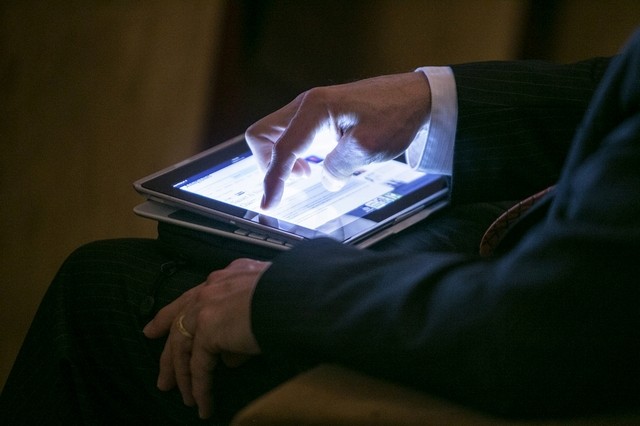US bans electronic devices on flights

WASHINGTON/LONDON. – The US has announced a ban on large electronic devices from cabin baggage on passenger flights from eight Muslim-majority countries. Bombs could be hidden in laptops, tablets, cameras, DVD players and electronic games, the Department of Homeland Security (DHS) said. The measure will affect nine airlines operating out of 10 airports. Phones are exempt from the new rules.
Britain is expected to follow the United States in banning laptops and tablets in airplane cabins on flights from some airports in the Middle East, media reports and sources said yesterday.
The BBC said the British restrictions “may differ” from those announced by the United States, but government sources confirmed that they were being reviewed.
“Obviously we are privy to the same intelligence as the Americans. We will be updating our plans later this afternoon,” a government source told AFP.
A transport ministry spokesman also said Britain’s plans were due to be updated later in the day.
The United States warned earlier that extremists plan to target passenger jets with bombs hidden in electronic devices, and banned carrying them in cabins on flights from 10 airports.
Senior US officials told reporters that nine airlines from eight countries had been given 96 hours to ban devices bigger than a mobile phone from the cabin.
Laptops, tablets and portable game consoles are affected by the ban – which applies to direct flights to the United States – but they may still be stowed in the hold in checked baggage.
The Turkish government has said the US ban is wrong and should be reversed.
Large electronic devices will only be allowed on board in checked baggage.
Passengers on some 50 flights a day from some of the busiest hubs in the Middle East, Turkey and North Africa will be required to follow the new rules.
The nine airlines affected by the US ban are Royal Jordanian, EgyptAir, Turkish Airlines, Saudi Arabian Airlines, Kuwait Airways, Royal Air Maroc, Qatar Airways, Emirates and Etihad Airways.
The airports affected are:
- Mohammed V International, Casablanca, Morocco
- Ataturk Airport, Istanbul, Turkey
- Cairo International Airport, Egypt
- Queen Alia International, Amman, Jordan
- King Abdulaziz International, Jeddah, Saudi Arabia
- King Khalid International, Riyadh, Saudi Arabia
- Kuwait International Airport
- Hamad International, Doha, Qatar
- Abu Dhabi International, United Arab Emirates
- Dubai International, United Arab Emirates
However, an Emirates spokeswoman told Reuters news agency the airline understood that the directive would come into effect on March 25 and remain valid until October 14, 2017.
In a statement, the DHS cited attacks on planes and airports over the past two years.
Bombs, it said, had been hidden in such items as a soft drink can, in the downing of a Russian airliner over Egypt in October 2015 with the loss of 224 lives, and the laptop used in the unsuccessful Somali attack last year.
“Terrorists have historically tried to hide explosives in shoes in 2001, use liquid explosives in 2006, and conceal explosives in printers in 2010 and suicide devices in underwear in 2009 and 2012,” it noted.
“Evaluated intelligence indicates that terrorist groups continue to target commercial aviation, to include smuggling explosive devices in various consumer items,” the DHS said.
The restrictions are believed to have been under consideration for several weeks.
Jamil al-Qsous, a former Jordanian aviation security official, told the Associated Press news agency that the ban meant “one less headache” for security agencies.
He said security measures at Jordan’s Queen Alia International Airport were among the most stringent in the region but the Americans had nonetheless taken “the right decision”.
Turkish Transport Minister Ahmet Arslan told reporters the ban was “not a right move”.
“We particularly emphasise how this will not benefit the passenger and that reverse steps or a softening should be adopted,” he added.
Aviation security expert Jeffrey Price told AP there could be downsides to the policy.
“There would be a huge disadvantage to having everyone put their electronics in checked baggage,” he said.
Thefts from baggage would skyrocket and it would be more difficult to detect battery fires in laptops in the hold than in the cabin, he argued.
Officials quoted by Reuters news agency said the new measure was not connected to US President Donald Trump’s efforts to ban travellers from six Muslim-majority states. – BBC/AFP/Reuters.







Comments